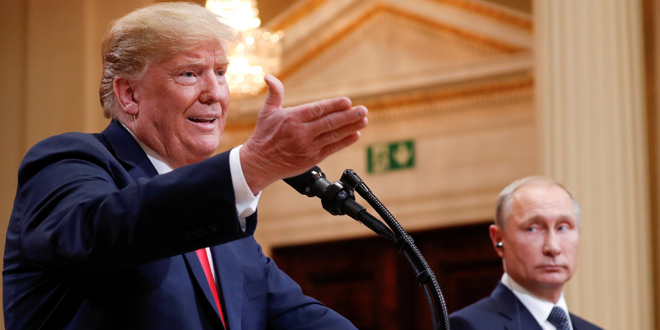
Jamshid Chalangi:
In tonight’s program of Behind the Headlines we discuss the Trump-Putin meeting in Helsinki with our guests Hossein Alive and Aram Hessami and find out if their behind the scene talks will have any consequence for the Middle East and the issue of Iranian troops in Syria.
Aram Hessami:
The discourse of the Iranian revolution was a left-wing/religious one or bettersaid, a mixture of Marxism and the radical Islamic view of Ali Shariati. The left and religious activists regarded the Shah’s regime as an ally of the US who acted to protect the American interests in the region.
But I believe during the Obama administration the Iranian regime started to evolve and a new kind of relationship with US began. In other words, the Islamic republic changed its attitude towards the US.
Now, under the Trump administration and the return of the sanctions again a new period of relationship between the two countries has begun which is very complicated.
Hossein Alavi:
I think the Islamic republic regime does not have a coherent foreign policy as it has always been based on ideological preferences and anti-Americanism, which have effectively become its identity. It is extremely difficult for the regime to abandon this identity, as they could not do it during the Clinton time.
And when the regime was effectively working with the Bush administration during the US invasion of Afghanistan and Iraq, it could still not elevate that cooperation into establishing even a low diplomatic relationship.
The nuclear deal was principally an American initiative and other countries simply followed the US line. Even this deal did not result in any improvement between the two countries.
Aram Hessami:
I disagree with Mr. Alavi as I believe it was the US that abandoned the nuclear deal under the pressure of the right-wing circles and I do not see Iran having done anything wrong to justify the US move.
The talk of Iran’s involvement in Syria, Yemen and Lebanon is just an excuse. You can see that inside Iran each faction reacts to this issue differently. Obama and Rouhani had already entered a kind of relationship and yesterday Russiathrew its support behind the nuclear deal.
Hossein Alavi:
Yes indeed, the Rouhani government had extended the hand of establishing a diplomatic relationship with the US but his government is not the ultimate decider on that subject and the real power in Iran lies in the hands of Khamenei and the Revolutionary Guard who in any case had already opposed the negotiations for the nuclear deal.
I believe the Rouhani government is no longer in the driving seat for any future possible negotiations with the US as Washington knows very well that if there is going to be such negotiations at all it will have to be between Trump and Khamenei himself.
 khalijefars News, Blogs, Art and Community
khalijefars News, Blogs, Art and Community








